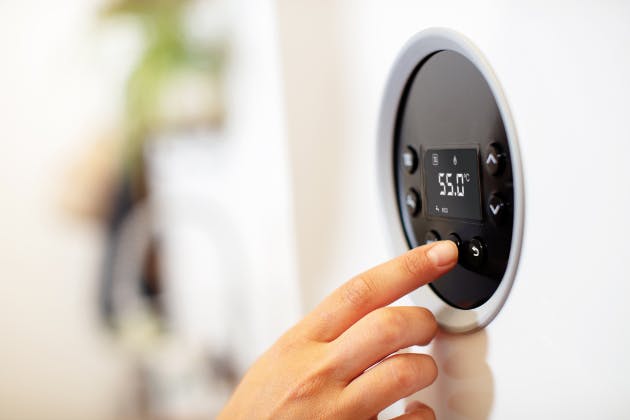LPG boilers have become a crucial heating solution for homes without access to gas mains, particularly in rural areas across the UK. These systems, which run on Liquid Petroleum Gas, offer an efficient and versatile alternative to traditional gas boilers. As homeowners increasingly seek cost-effective and environmentally friendly heating options, understanding the ins and outs of LPG boilers is essential.

What is an LPG Boiler?
An LPG boiler is a heating system that uses Liquid Petroleum Gas (LPG) as its fuel source. LPG is a mixture of hydrocarbon gases, primarily propane and butane. These boilers function similarly to standard gas boilers but are specifically designed to run on LPG stored in external tanks rather than natural gas from the mains.
LPG boilers are crucial for properties without access to the gas network, particularly in rural areas. They provide an efficient alternative to oil-fired systems and electric heating options.
Key Differences Between LPG and Gas Boilers
The primary distinction between LPG and gas boilers lies in their fuel source and storage requirements:
- Fuel Source: LPG boilers use bottled gas, while gas boilers utilise natural gas from the mains.
- Storage: LPG requires an external storage tank, typically placed in the garden. Gas boilers connect directly to the mains supply, eliminating the need for on-site storage.
- Availability: LPG boilers can be installed anywhere, whereas gas boilers are limited to areas with gas mains connections.
- Cost: LPG tends to be more expensive per unit than natural gas, but prices can fluctuate.
Benefits of LPG Boilers
The top advantages of LPG boilers include:
- Versatility: Ideal for properties without access to gas mains.
- Efficiency: Modern LPG boilers can achieve efficiency ratings of up to 90%, comparable to natural gas boilers.
- Lower Emissions: LPG produces fewer carbon emissions compared to oil, making it a cleaner fossil fuel option.
- Quiet Operation: LPG boilers typically run more quietly than oil-burning systems.
- Consistent Supply: Unlike mains gas, LPG supply is not affected by network issues or power cuts.
Types of Boilers Compatible with LPG
- Combi Boilers: These compact units provide both heating and hot water on demand. They're suitable for small to medium-sized homes with one bathroom.
- System Boilers: These boilers work with a separate hot water cylinder but don't require a cold water tank in the loft. They're ideal for properties with multiple bathrooms and higher hot water demands.
- Regular Boilers: Also known as conventional or heat-only boilers, these systems require both a hot water cylinder and a cold water tank. They're best suited for larger homes with multiple bathrooms and high hot water usage.
How Does an LPG Boiler Work?
LPG boilers operate on the same principles as natural gas boilers:
- The LPG is stored in a pressurised tank as a liquid.
- When released, it vaporises and travels through pipes to the boiler.
- The gas is ignited in the combustion chamber, heating the water in the heat exchanger.
- This hot water is then circulated through radiators or underfloor heating systems to warm the property.
- For hot water, the system either heats water on demand (combi boilers) or stores it in a cylinder (system and regular boilers).
What Costs Are Involved In Running an LPG Boiler?
The cost of running an LPG boiler varies depending on several factors:
- Property Size: Larger homes require more energy for heating.
- Insulation: Well-insulated properties retain heat better, reducing energy consumption.
- Usage Patterns: The frequency and duration of heating and hot water use impact costs.
- LPG Prices: These can fluctuate based on market conditions and supplier agreements.
Based on average UK energy consumption of 12,000 kWh per year, the annual cost of running an LPG boiler is approximately £796. However, this figure can vary significantly based on the factors mentioned above and current LPG prices.
To optimise costs, consider:
- Regular maintenance to ensure efficient operation
- Upgrading to a high-efficiency LPG boiler
- Improving home insulation
- Installing smart heating controls to manage energy use effectively
Can I convert my existing gas boiler to run on LPG?
Many modern gas boilers can be converted to run on LPG. This typically involves changing the burner jets and adjusting the gas valve. However, always consult a Gas Safe-registered engineer to determine if your boiler is suitable for conversion and to carry out the work.
How efficient are LPG boilers compared to other heating systems?
LPG boilers are highly efficient, often achieving efficiency ratings of 90% or higher. They're generally more efficient than oil boilers and produce fewer carbon emissions, making them a more environmentally friendly option for off-grid properties.
What safety measures should I implement when using an LPG boiler?
Key safety measures include proper storage of LPG tanks (outdoors, away from buildings and ignition sources), regular maintenance by a qualified engineer, installation of carbon monoxide detectors, and ensuring adequate ventilation in the boiler room.
What's the typical lifespan of an LPG boiler?
With proper maintenance, an LPG boiler can last 10-15 years. However, this can vary depending on the make, model, and how well it's maintained.
What size LPG tank do I need for my boiler?
Tank size depends on your property's size and energy consumption. A typical 4-bedroom house might require a 1,000-2,000 litre tank. Consult with your LPG supplier to determine the appropriate size for your needs.
Contact us for advice
Have more questions when it comes to all things LPG boilers? Get in touch with our friendly team at 08001182467 or 07717574470 or by filling in our online contact form. We work across Yorkshire, including Richmond, Wetherby, York, and Harrogate.


